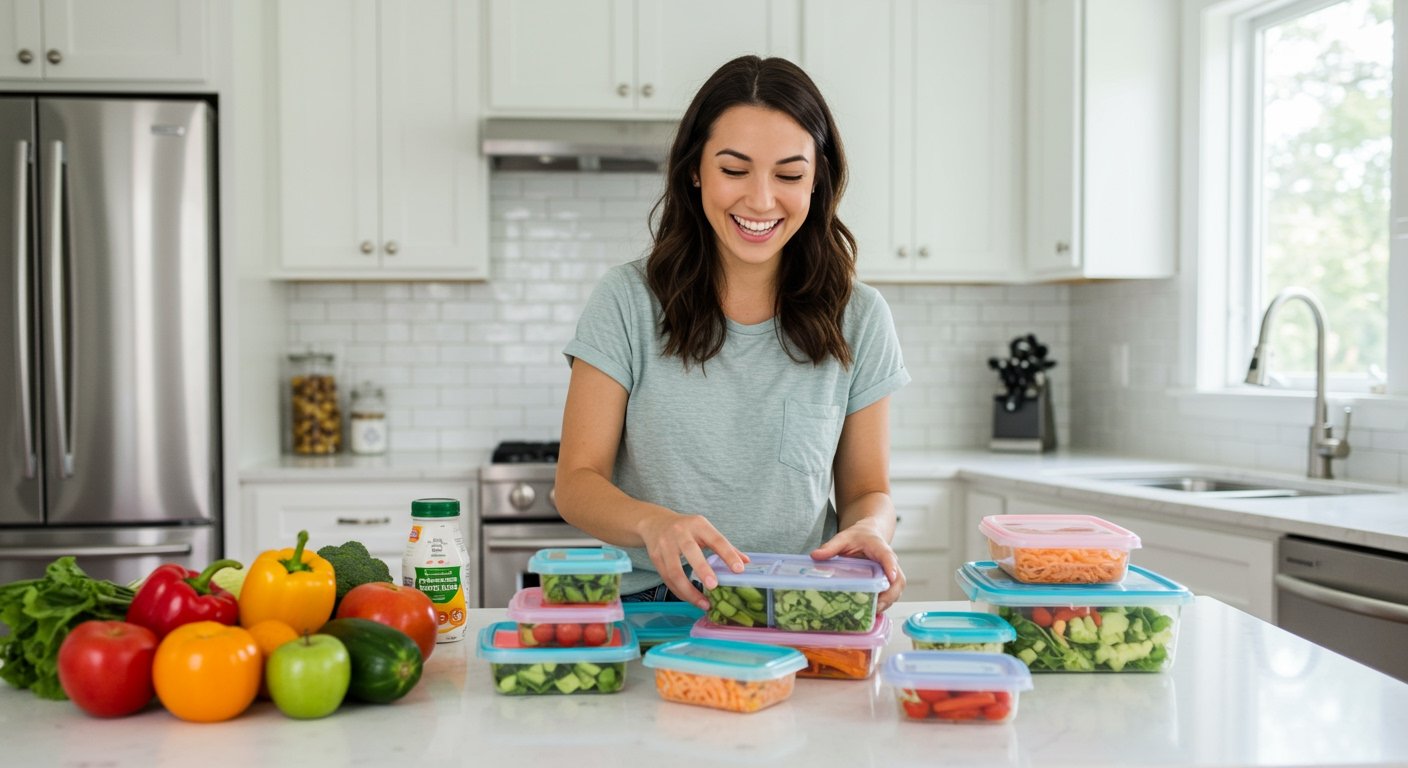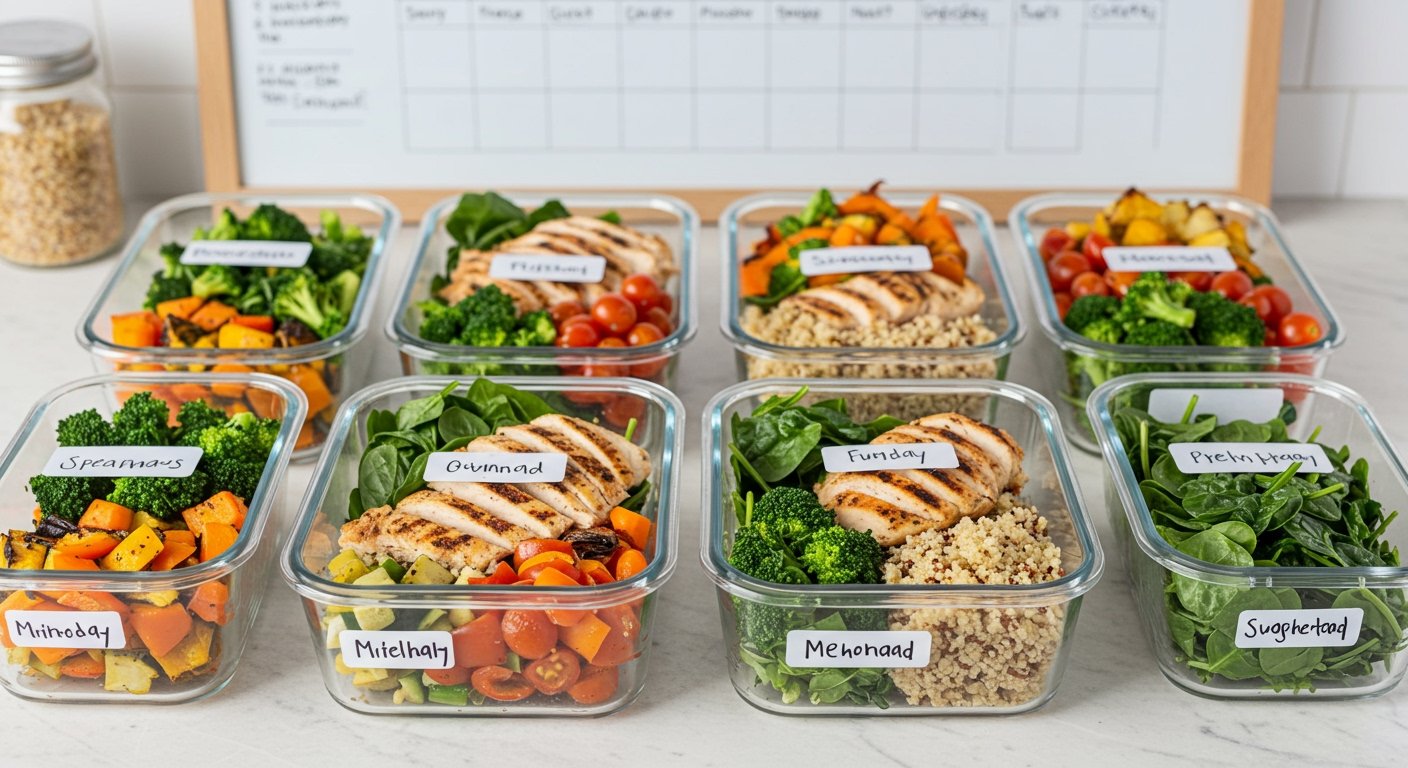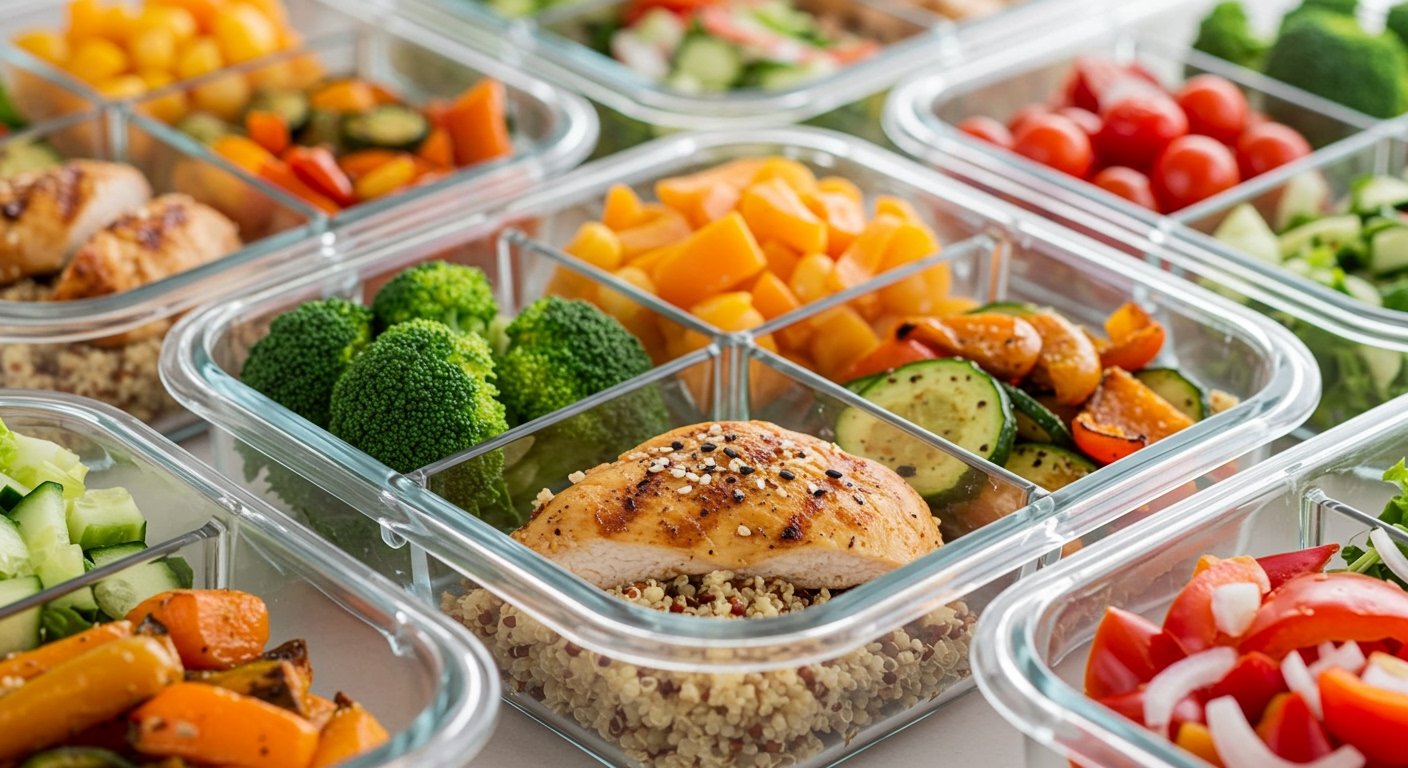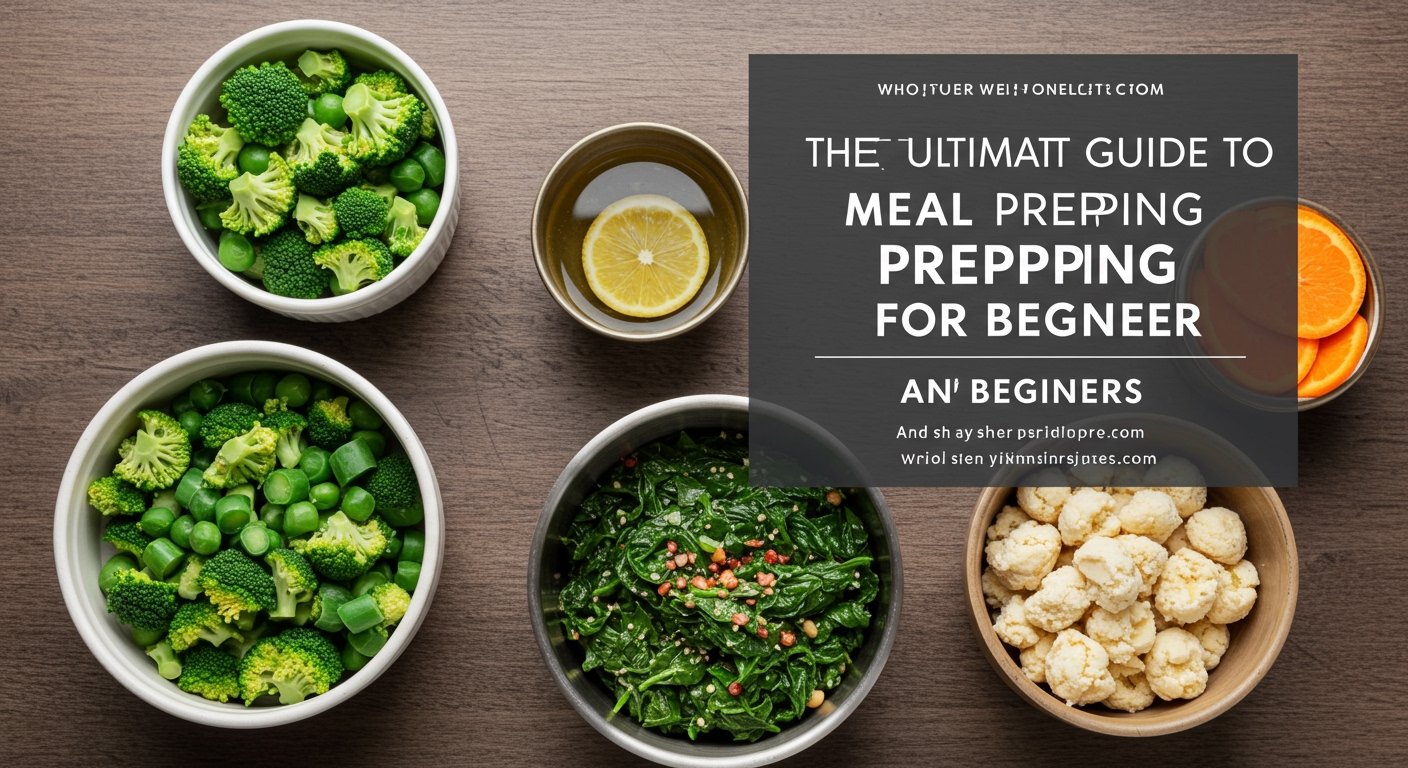Are you tired of daily dinner dilemmas, expensive takeout, or struggling to maintain healthy eating habits? If so, then meal prepping for beginners might be your ultimate solution! Meal prepping is the practice of preparing meals or components of meals in advance, usually for several days. It’s a powerful strategy that can save you time, money, and help you achieve your health goals, making it an increasingly popular choice for busy individuals. In fact, nearly 9 out of 10 Americans have engaged in meal prepping at least once, with 44% reportedly doing it regularly. Around 32% of individuals choose to meal prep primarily to eat healthier and maintain a balanced diet, alongside motivations of saving time and money.

This comprehensive guide will walk you through everything you need to know about how to start meal prepping, offering practical tips and easy meal prep recipes to make your journey enjoyable and sustainable.
What is Meal Prepping?
At its core, meal prepping is about planning and preparing your food ahead of time. It’s a simple concept with many variations, adaptable to any lifestyle. Whether you cook entire meals, chop vegetables, or portion out snacks, the goal is to streamline your eating habits and make healthy choices more accessible. It could mean cooking a large batch of chili on Sunday to enjoy throughout the week, or simply preparing your breakfast smoothies and cutting veggies for stir-fries a few days in advance. It’s a flexible approach that puts you in control of what you eat.
Why Should You Start Meal Prepping? The Benefits!
The advantages of incorporating meal preparation into your routine are significant, especially for beginners. The meal prep market itself is booming, valued at approximately USD 5.68 billion in 2024 and projected to reach USD 12.89 billion by 2033, demonstrating its growing appeal due to hectic schedules and the need for nutritional food. [1] Here’s why so many people are embracing this habit:
Key Takeaways
- **Saves Time:** The average person spends approximately 60 minutes a week grocery shopping, 64 minutes preparing meals, and 324 minutes a week cooking. Meal prepping can significantly reduce the daily time commitment by consolidating these tasks into one or two dedicated sessions. [5]
- **Saves Money:** By planning your meals and buying in bulk, you can drastically cut down on impulse purchases and expensive takeout. Meal prepping can help individuals save between $2,340 and $3,900 annually by reducing expenses on food consumed away from home. [3]
- **Promotes Healthier Eating:** With pre-made, nutritious meals readily available, you’re less likely to reach for unhealthy fast food options. Research indicates that individuals who plan their meals tend to have a higher-quality diet, consuming more fruits and vegetables and maintaining a more balanced intake of nutrients. [5, 14]
- **Aids Weight Management:** Controlling ingredients and portion sizes is easier when you prepare your own food. This makes meal prep for weight loss beginners particularly effective. [15]
- **Reduces Food Waste:** Planning ensures you buy only what you need and use all ingredients, minimizing spoilage. [3]
- **Lowers Stress:** Knowing your meals are taken care of eliminates daily decision fatigue and stress. Studies have even linked more time spent on meal preparation to better mental health and lower stress levels. [4]

How to Start Meal Prepping for Beginners: Your Step-by-Step Plan
Beginning your meal prep journey doesn’t have to be overwhelming. These meal prep steps for beginners will set you up for success.
1. Plan Your Beginner Meal Prep Plan and Grocery List
This is the cornerstone of successful meal prepping. Start by deciding which meals you want to prep (breakfasts, lunches, dinners, or snacks). For a beginner meal prep plan, aim for 2-3 meals first, rather than a whole week. Consider themes like “Meatless Monday” or explore a variety of easy meal prep recipes. A great resource for inspiration is this collection of 25 Easy Weeknight Dinners Under 30 Minutes. Once you have your recipes, create a detailed meal prep grocery list, checking your pantry for existing ingredients. This helps with budget meal prep ideas as well.
2. Smart Shopping for Your Weekly Meal Prep
With your list in hand, hit the grocery store. Stick to your list to avoid impulse buys that can derail your budget and healthy eating goals. Look for sales on staples, and consider buying in bulk for non-perishable items. This is key for budget meal prep ideas.

3. Efficient Cooking: Quick Meal Prep Ideas
- Dedicate a specific time slot (e.g., Sunday afternoon) for your cooking session. This is where the magic happens! To make the most of your time:
- Batch Cook: Cook larger quantities of proteins (chicken, lentils, quinoa) and grains (rice, farro).
- Chop Everything at Once: Prep all your vegetables at the beginning. If you need to brush up on your skills, check out How to Master Basic Knife Skills for Home Cooks.
- Utilize Appliances: Ovens, slow cookers, and Instant Pots can handle multiple dishes simultaneously. These are excellent for quick meal prep ideas.
- Layer Flavors: Cook bland staples, then add different sauces and spices to create variety for your meal prep ideas for beginners.
4. Storage Solutions: Best Meal Prep Containers
- Choosing the right containers is crucial for keeping your food fresh and organized. Look for:
- Airtight and Leak-Proof: Prevents spoilage and messy spills.
- Microwave-Safe: For easy reheating.
- Dishwasher-Safe: For simple cleanup.
- Glass or BPA-Free Plastic: Durable and safe options.
- Portioned Containers: Some containers come with dividers, perfect for keeping components separate and managing portion control. These are the best meal prep containers for maintaining meal integrity.
Healthy Meal Prep for Beginners: Tips for Success
For those focusing on healthy meal prep for beginners, here are some key considerations:

Meal Prepping for One: Simple Strategies
If you’re cooking for yourself, simple meal prep for one is entirely achievable. Focus on versatile ingredients that can be used in multiple ways. For instance, roast a large tray of vegetables and a protein source, then use them in salads, wraps, or stir-fries throughout the week. Don’t be afraid of leftovers – they are the essence of meal prepping for one!
Advanced Weekly Meal Prep Tips
- Once you’ve mastered the basics of meal prepping for beginners, you can explore more advanced strategies:
- Freezer-Friendly Meals: Cook double batches of soups, stews, and casseroles to freeze for future busy weeks.
- Ingredient Prep: Sometimes, simply chopping all your vegetables or cooking a big batch of grains is enough to make daily cooking faster.
- Theme Weeks: Design entire weeks around a specific cuisine or ingredient to simplify planning.
- Utilize External Resources: The National Institutes of Health (NIH) emphasizes the benefits of home meal preparation for better health outcomes and as a powerful medical intervention. [12] The Mayo Clinic also offers excellent advice on planning ahead and creating daily menus for a heart-healthy diet. [18]
Conclusion
Meal prepping for beginners is a highly rewarding habit that offers significant benefits for your health, wallet, and peace of mind. By starting with a simple plan, gradually expanding your repertoire of easy meal prep recipes, and embracing smart storage, you’ll soon become a meal prep pro. Remember, consistency is more important than perfection. Start small, be patient, and enjoy the journey to a more organized, healthier, and flavorful life!
Frequently Asked Questions
What is the easiest way to start meal prepping?
The easiest way to start meal prepping is to choose just one meal (e.g., lunch) for 2-3 days a week. Pick a simple recipe, make a small grocery list, and dedicate an hour or two on a weekend to prepare it. Gradually increase the number of meals as you get comfortable.
What are some good meal prep ideas for beginners?
Great meal prep ideas for beginners include overnight oats, chicken and roasted vegetable bowls, simple pasta dishes, lentil soup, or pre-chopped salad ingredients. Focus on recipes with minimal components and easy-to-find ingredients.
How long do meal-prepped meals last in the fridge?
Most meal-prepped meals will last safely in the refrigerator for 3-4 days when stored in airtight containers. Cooked proteins, grains, and vegetables generally adhere to this guideline. Some foods, like delicate greens or seafood, might have a shorter lifespan.
Is meal prepping actually cheaper than eating out?
Yes, meal prepping is significantly cheaper than eating out. By purchasing ingredients in bulk, reducing food waste, and avoiding restaurant markups, individuals can save thousands of dollars annually. It allows for better budget control over food expenses.
What kind of containers should I use for meal prep?
For meal prepping, opt for airtight, leak-proof, microwave-safe, and dishwasher-safe containers. Glass containers are excellent for durability and ease of cleaning, while BPA-free plastic containers are a lighter, more portable option. Look for containers with dividers if you prefer to keep food components separate.
